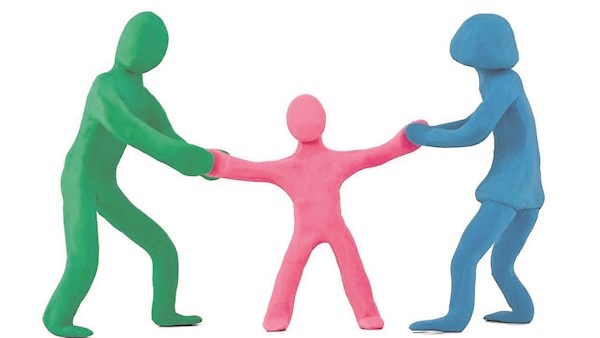The World Health Organisation recently recognised the existence of parental alienation as a condition. The concept of parental alienation was first coined by Dr Richard Gardner in the 1980s, and refers to the behaviour of one parent against another whereby they deliberately estrange a once loved parent from their children during an acrimonious separation.
The inclusion of it in the 11th revision of the International Classification of Diseases came as great relief to anyone working in the therapeutic space as clinicians have been dealing with this phenomenon for many years.
Parent alienation is something I have written about many times, as I find myself working with it in all its complexity nearly every week in my own clinic.
It is a profoundly complex phenomenon to work with. As clinicians we do not have any clear criteria on how to detect the presence of alienation, but the absence of any real or significant reason why the child has come to disconnect from a once loved parent would generally signal the potential presence of parent alienation.
Of course, children may become estranged from one parent due to neglect or abuse and this most certainly is not alienation, this would be what we would classify as; justified parental estrangement.
And there are clear indicators, which help the clinician differentiate between PA and Justified estrangement. Many critics of PA suggest it can give power to an abusive parent (as they use it as an excuse for the child’s reluctance to visit them) while others suggest that, due to the corrupted narrative held by a child and the courts recent willingness to hear that child, the system can come to promote the alienation of a parent.
In my experience the parent driving a particular narrative against a once loved parent does not realise the utter devastation they are bringing into the life of everyone involved.
Of course, some parents are so hurt that they are willing to go to any lengths to eradicate their ex-partner from the lives of their children.
The World Health Organisation recently recognised the existence of parental alienation as a condition. The concept of parental alienation was first coined by Dr Richard Gardner in the 1980s, and refers to the behaviour of one parent against another whereby they deliberately estrange a once loved parent from their children during an acrimonious separation.
The inclusion of it in the 11th revision of the International Classification of Diseases came as great relief to anyone working in the therapeutic space as clinicians have been dealing with this phenomenon for many years.
Parent alienation is something I have written about many times, as I find myself working with it in all its complexity nearly every week in my own clinic.
It is a profoundly complex phenomenon to work with. As clinicians we do not have any clear criteria on how to detect the presence of alienation, but the absence of any real or significant reason why the child has come to disconnect from a once loved parent would generally signal the potential presence of parent alienation.
Of course, children may become estranged from one parent due to neglect or abuse and this most certainly is not alienation, this would be what we would classify as; justified parental estrangement.
And there are clear indicators, which help the clinician differentiate between PA and Justified estrangement. Many critics of PA suggest it can give power to an abusive parent (as they use it as an excuse for the child’s reluctance to visit them) while others suggest that, due to the corrupted narrative held by a child and the courts recent willingness to hear that child, the system can come to promote the alienation of a parent.
In my experience the parent driving a particular narrative against a once loved parent does not realise the utter devastation they are bringing into the life of everyone involved.
Of course, some parents are so hurt that they are willing to go to any lengths to eradicate their ex-partner from the lives of their children.
READ MORE
And when this mentality has taken hold the parent, generally the caregiver, can seek out therapy in the hope that they can also align the therapist into their narrative and help further isolate their ex-partner.
So, as a therapist, it can be one of the most challenging phenomenon to deal with in the therapeutic space as you try to support the entire family as they bring themselves to the brink of annihilation.
Over the years I have found it one of the most recurring and problematic family issues to work with. And I have always felt that therapist’s need specific training in how to work with the issue because if it is mismanaged the consequences can be devastating for the entire family.
In my experience, the child that is manipulated into a particular position against a loved parent suffers hugely. The effects on the child vary from, depression, anxiety to self-harm and even suicide ideation. It can impact their ability to form healthy relationships in their adult life.
So, the fallout can last a lifetime. Also, a child that has alienated a parent can come to resent the parent that manipulated them as they move into the adult world and they begin to view what has taken place in their life through the lens of an adult.
And therefore the alienator becomes alienated and more devastation ensues.
There is no winner with parental alienation, just utter destruction of the family.
What can I do, if I’m a victim of alienation?
When alienated parents come to me for advice the first thing I tell them is never give your child the opportunity to say, ‘you never made an effort to stay in contact’. Always prove to them that you didn’t give up on them. An alienated parent can be on the receiving end of a tirade of abuse from their children and this can be very difficult to experience.
One parent told me recently, ‘I have to give up for my own mental health’. The sadness in the room was tangible as the client described his feelings of utter helplessness at the hands of his ex-wife. However, when I explained to him the prognosis on PA is quiet good and children generally start to view things more critically as they move out of adolescence he became hopeful again.
And he resumed contacting his children to show them he hadn’t given up. Never give up. That is exactly what parental alienation is designed to do — force a parent to stop seeing their children because it is too difficult to continue.
The disintegration of a relationship is never easy, especially when there are children involved. However, when children are used as collateral damage in a game of total war everyone loses and the potential harm to those children can be absolute and last a lifetime.



